A Comprehensive Report on Ethical Issues in Health and Social Care
VerifiedAdded on 2020/10/22
|9
|3047
|300
Report
AI Summary
This report delves into the complex landscape of ethical issues within health and social care, examining a case scenario involving a terminally ill patient, Patient A, and the ethical dilemmas faced by healthcare providers. The report explores key ethical principles such as autonomy, justice, non-maleficence, and beneficence, applying them to the case study. It also analyzes the theories of consequentialism and principalism, comparing their approaches to ethical decision-making. The analysis includes discussions on whether to disclose a patient's poor prognosis, the impact on patient care, and the role of family wishes. The report concludes by evaluating the chosen decision in light of the ethical frameworks presented and emphasizes the importance of balancing patient rights, family concerns, and the application of ethical principles in healthcare settings. The report utilized various literature search strategies to support its analysis and conclusions.
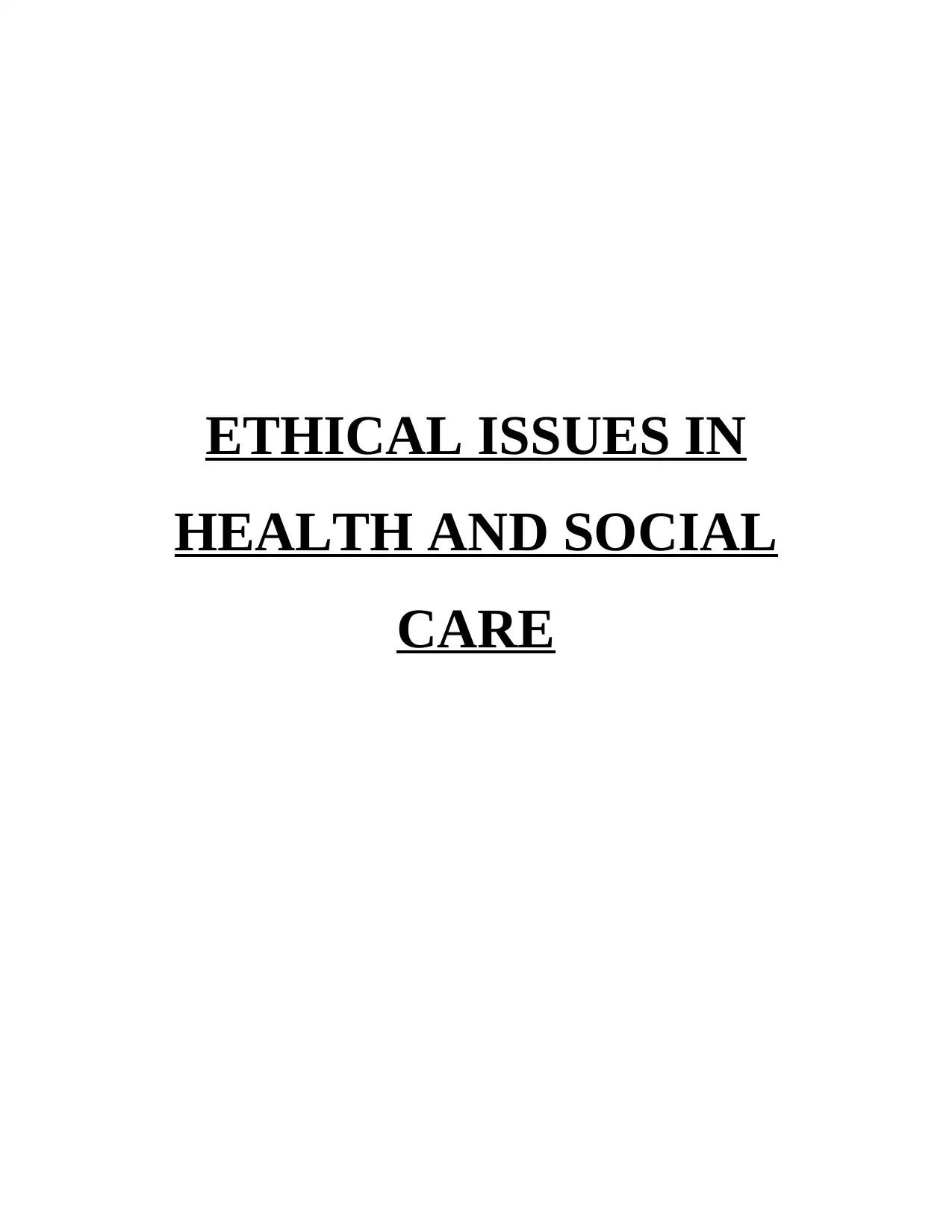
ETHICAL ISSUES IN
HEALTH AND SOCIAL
CARE
HEALTH AND SOCIAL
CARE
Paraphrase This Document
Need a fresh take? Get an instant paraphrase of this document with our AI Paraphraser
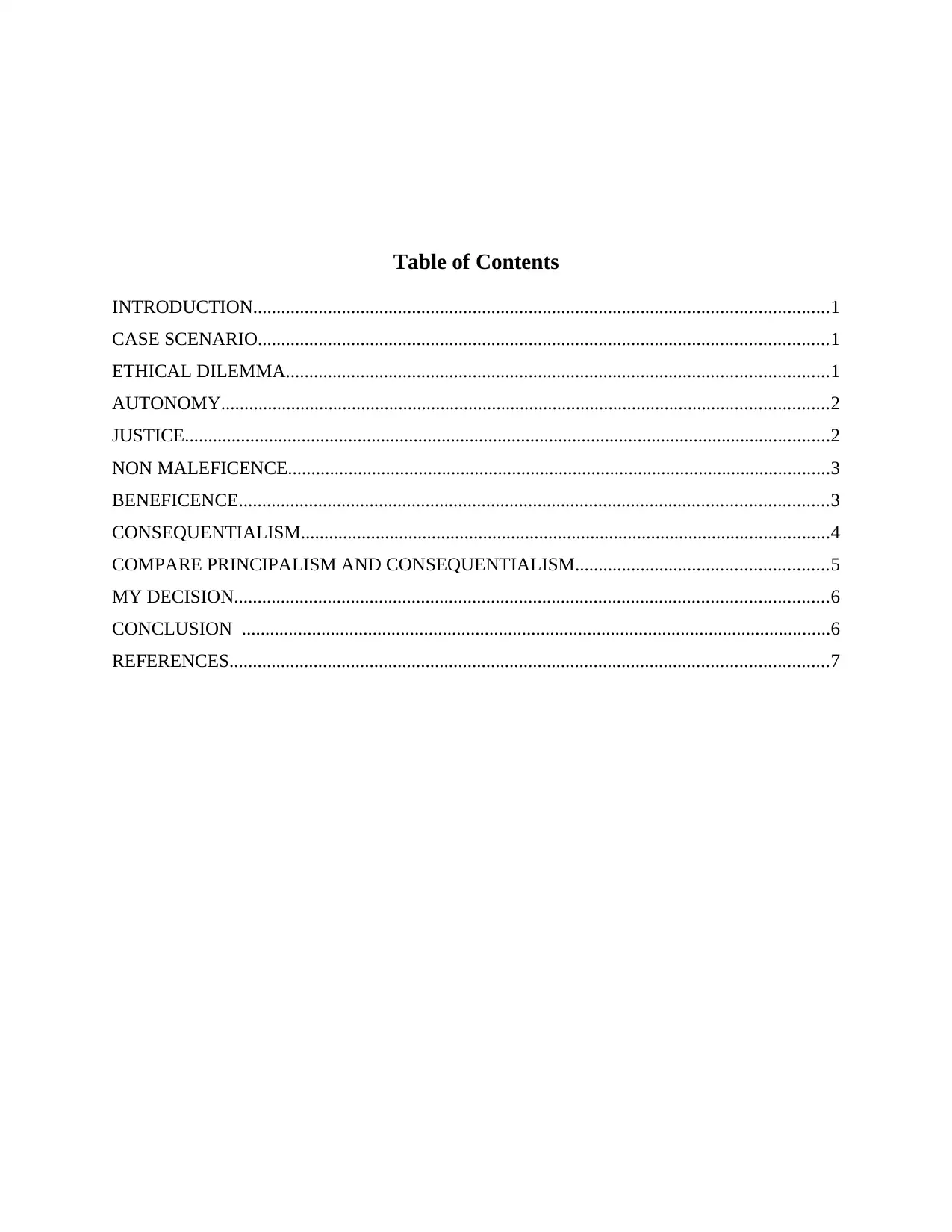
Table of Contents
INTRODUCTION...........................................................................................................................1
CASE SCENARIO..........................................................................................................................1
ETHICAL DILEMMA....................................................................................................................1
AUTONOMY..................................................................................................................................2
JUSTICE..........................................................................................................................................2
NON MALEFICENCE....................................................................................................................3
BENEFICENCE..............................................................................................................................3
CONSEQUENTIALISM.................................................................................................................4
COMPARE PRINCIPALISM AND CONSEQUENTIALISM......................................................5
MY DECISION...............................................................................................................................6
CONCLUSION ..............................................................................................................................6
REFERENCES................................................................................................................................7
INTRODUCTION...........................................................................................................................1
CASE SCENARIO..........................................................................................................................1
ETHICAL DILEMMA....................................................................................................................1
AUTONOMY..................................................................................................................................2
JUSTICE..........................................................................................................................................2
NON MALEFICENCE....................................................................................................................3
BENEFICENCE..............................................................................................................................3
CONSEQUENTIALISM.................................................................................................................4
COMPARE PRINCIPALISM AND CONSEQUENTIALISM......................................................5
MY DECISION...............................................................................................................................6
CONCLUSION ..............................................................................................................................6
REFERENCES................................................................................................................................7
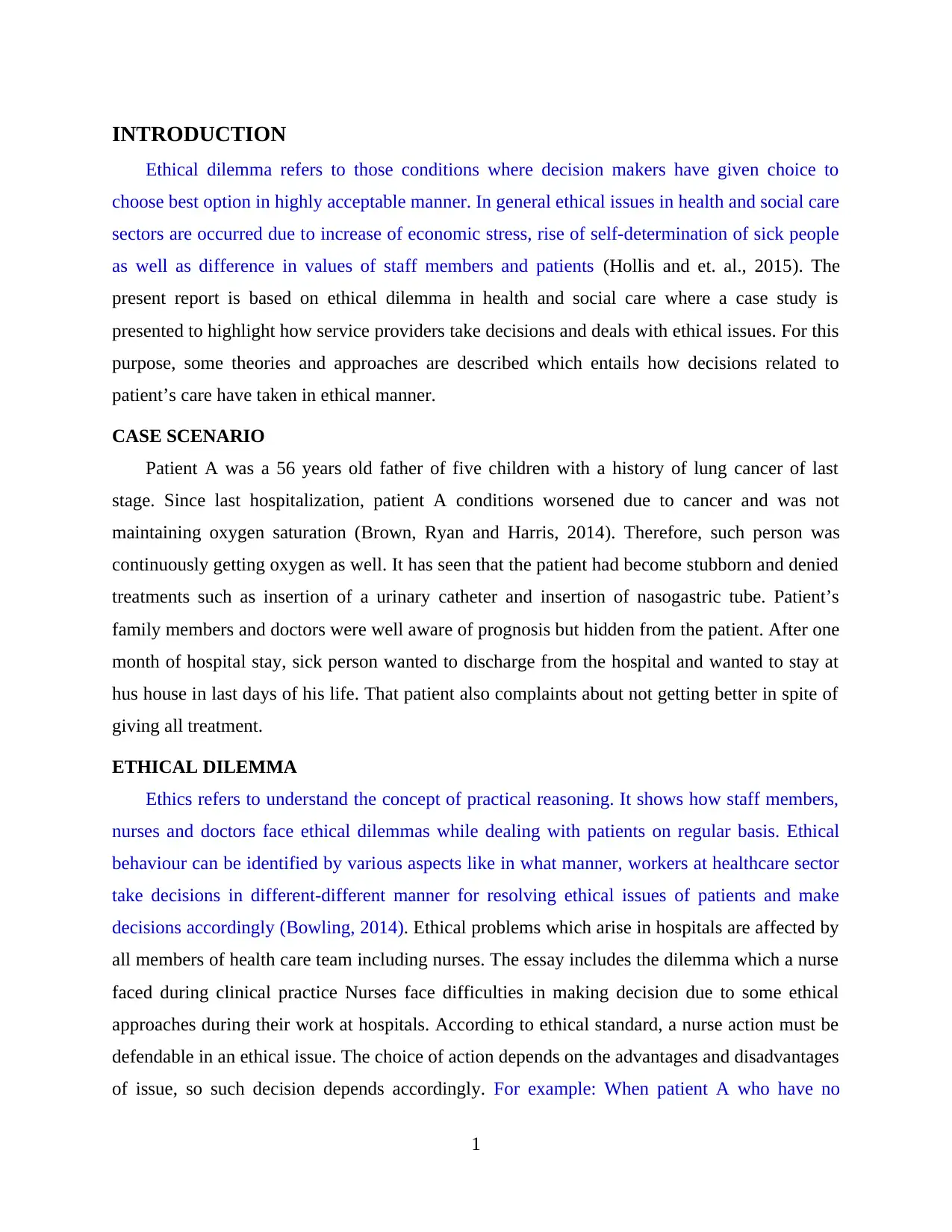
INTRODUCTION
Ethical dilemma refers to those conditions where decision makers have given choice to
choose best option in highly acceptable manner. In general ethical issues in health and social care
sectors are occurred due to increase of economic stress, rise of self-determination of sick people
as well as difference in values of staff members and patients (Hollis and et. al., 2015). The
present report is based on ethical dilemma in health and social care where a case study is
presented to highlight how service providers take decisions and deals with ethical issues. For this
purpose, some theories and approaches are described which entails how decisions related to
patient’s care have taken in ethical manner.
CASE SCENARIO
Patient A was a 56 years old father of five children with a history of lung cancer of last
stage. Since last hospitalization, patient A conditions worsened due to cancer and was not
maintaining oxygen saturation (Brown, Ryan and Harris, 2014). Therefore, such person was
continuously getting oxygen as well. It has seen that the patient had become stubborn and denied
treatments such as insertion of a urinary catheter and insertion of nasogastric tube. Patient’s
family members and doctors were well aware of prognosis but hidden from the patient. After one
month of hospital stay, sick person wanted to discharge from the hospital and wanted to stay at
hus house in last days of his life. That patient also complaints about not getting better in spite of
giving all treatment.
ETHICAL DILEMMA
Ethics refers to understand the concept of practical reasoning. It shows how staff members,
nurses and doctors face ethical dilemmas while dealing with patients on regular basis. Ethical
behaviour can be identified by various aspects like in what manner, workers at healthcare sector
take decisions in different-different manner for resolving ethical issues of patients and make
decisions accordingly (Bowling, 2014). Ethical problems which arise in hospitals are affected by
all members of health care team including nurses. The essay includes the dilemma which a nurse
faced during clinical practice Nurses face difficulties in making decision due to some ethical
approaches during their work at hospitals. According to ethical standard, a nurse action must be
defendable in an ethical issue. The choice of action depends on the advantages and disadvantages
of issue, so such decision depends accordingly. For example: When patient A who have no
1
Ethical dilemma refers to those conditions where decision makers have given choice to
choose best option in highly acceptable manner. In general ethical issues in health and social care
sectors are occurred due to increase of economic stress, rise of self-determination of sick people
as well as difference in values of staff members and patients (Hollis and et. al., 2015). The
present report is based on ethical dilemma in health and social care where a case study is
presented to highlight how service providers take decisions and deals with ethical issues. For this
purpose, some theories and approaches are described which entails how decisions related to
patient’s care have taken in ethical manner.
CASE SCENARIO
Patient A was a 56 years old father of five children with a history of lung cancer of last
stage. Since last hospitalization, patient A conditions worsened due to cancer and was not
maintaining oxygen saturation (Brown, Ryan and Harris, 2014). Therefore, such person was
continuously getting oxygen as well. It has seen that the patient had become stubborn and denied
treatments such as insertion of a urinary catheter and insertion of nasogastric tube. Patient’s
family members and doctors were well aware of prognosis but hidden from the patient. After one
month of hospital stay, sick person wanted to discharge from the hospital and wanted to stay at
hus house in last days of his life. That patient also complaints about not getting better in spite of
giving all treatment.
ETHICAL DILEMMA
Ethics refers to understand the concept of practical reasoning. It shows how staff members,
nurses and doctors face ethical dilemmas while dealing with patients on regular basis. Ethical
behaviour can be identified by various aspects like in what manner, workers at healthcare sector
take decisions in different-different manner for resolving ethical issues of patients and make
decisions accordingly (Bowling, 2014). Ethical problems which arise in hospitals are affected by
all members of health care team including nurses. The essay includes the dilemma which a nurse
faced during clinical practice Nurses face difficulties in making decision due to some ethical
approaches during their work at hospitals. According to ethical standard, a nurse action must be
defendable in an ethical issue. The choice of action depends on the advantages and disadvantages
of issue, so such decision depends accordingly. For example: When patient A who have no
1
⊘ This is a preview!⊘
Do you want full access?
Subscribe today to unlock all pages.

Trusted by 1+ million students worldwide
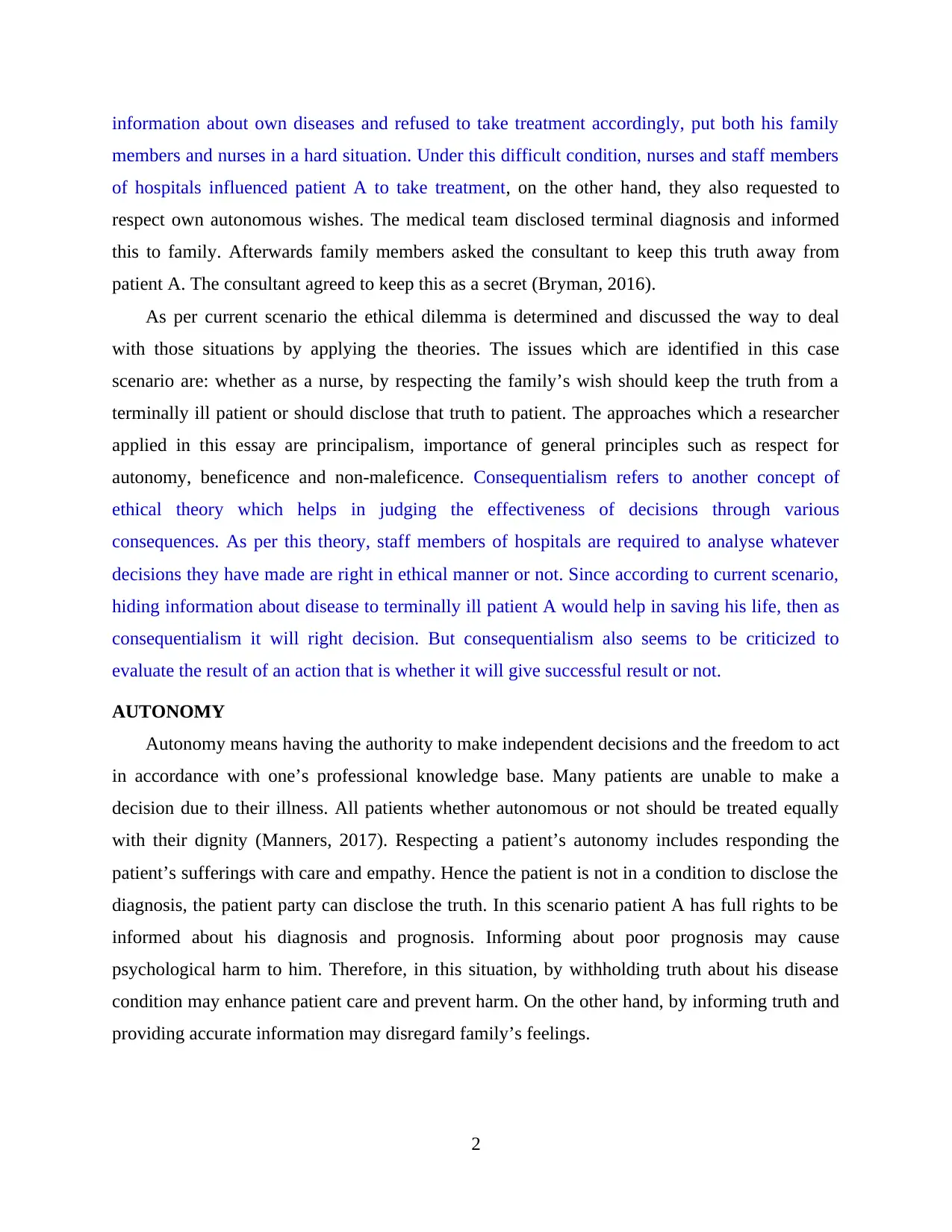
information about own diseases and refused to take treatment accordingly, put both his family
members and nurses in a hard situation. Under this difficult condition, nurses and staff members
of hospitals influenced patient A to take treatment, on the other hand, they also requested to
respect own autonomous wishes. The medical team disclosed terminal diagnosis and informed
this to family. Afterwards family members asked the consultant to keep this truth away from
patient A. The consultant agreed to keep this as a secret (Bryman, 2016).
As per current scenario the ethical dilemma is determined and discussed the way to deal
with those situations by applying the theories. The issues which are identified in this case
scenario are: whether as a nurse, by respecting the family’s wish should keep the truth from a
terminally ill patient or should disclose that truth to patient. The approaches which a researcher
applied in this essay are principalism, importance of general principles such as respect for
autonomy, beneficence and non-maleficence. Consequentialism refers to another concept of
ethical theory which helps in judging the effectiveness of decisions through various
consequences. As per this theory, staff members of hospitals are required to analyse whatever
decisions they have made are right in ethical manner or not. Since according to current scenario,
hiding information about disease to terminally ill patient A would help in saving his life, then as
consequentialism it will right decision. But consequentialism also seems to be criticized to
evaluate the result of an action that is whether it will give successful result or not.
AUTONOMY
Autonomy means having the authority to make independent decisions and the freedom to act
in accordance with one’s professional knowledge base. Many patients are unable to make a
decision due to their illness. All patients whether autonomous or not should be treated equally
with their dignity (Manners, 2017). Respecting a patient’s autonomy includes responding the
patient’s sufferings with care and empathy. Hence the patient is not in a condition to disclose the
diagnosis, the patient party can disclose the truth. In this scenario patient A has full rights to be
informed about his diagnosis and prognosis. Informing about poor prognosis may cause
psychological harm to him. Therefore, in this situation, by withholding truth about his disease
condition may enhance patient care and prevent harm. On the other hand, by informing truth and
providing accurate information may disregard family’s feelings.
2
members and nurses in a hard situation. Under this difficult condition, nurses and staff members
of hospitals influenced patient A to take treatment, on the other hand, they also requested to
respect own autonomous wishes. The medical team disclosed terminal diagnosis and informed
this to family. Afterwards family members asked the consultant to keep this truth away from
patient A. The consultant agreed to keep this as a secret (Bryman, 2016).
As per current scenario the ethical dilemma is determined and discussed the way to deal
with those situations by applying the theories. The issues which are identified in this case
scenario are: whether as a nurse, by respecting the family’s wish should keep the truth from a
terminally ill patient or should disclose that truth to patient. The approaches which a researcher
applied in this essay are principalism, importance of general principles such as respect for
autonomy, beneficence and non-maleficence. Consequentialism refers to another concept of
ethical theory which helps in judging the effectiveness of decisions through various
consequences. As per this theory, staff members of hospitals are required to analyse whatever
decisions they have made are right in ethical manner or not. Since according to current scenario,
hiding information about disease to terminally ill patient A would help in saving his life, then as
consequentialism it will right decision. But consequentialism also seems to be criticized to
evaluate the result of an action that is whether it will give successful result or not.
AUTONOMY
Autonomy means having the authority to make independent decisions and the freedom to act
in accordance with one’s professional knowledge base. Many patients are unable to make a
decision due to their illness. All patients whether autonomous or not should be treated equally
with their dignity (Manners, 2017). Respecting a patient’s autonomy includes responding the
patient’s sufferings with care and empathy. Hence the patient is not in a condition to disclose the
diagnosis, the patient party can disclose the truth. In this scenario patient A has full rights to be
informed about his diagnosis and prognosis. Informing about poor prognosis may cause
psychological harm to him. Therefore, in this situation, by withholding truth about his disease
condition may enhance patient care and prevent harm. On the other hand, by informing truth and
providing accurate information may disregard family’s feelings.
2
Paraphrase This Document
Need a fresh take? Get an instant paraphrase of this document with our AI Paraphraser
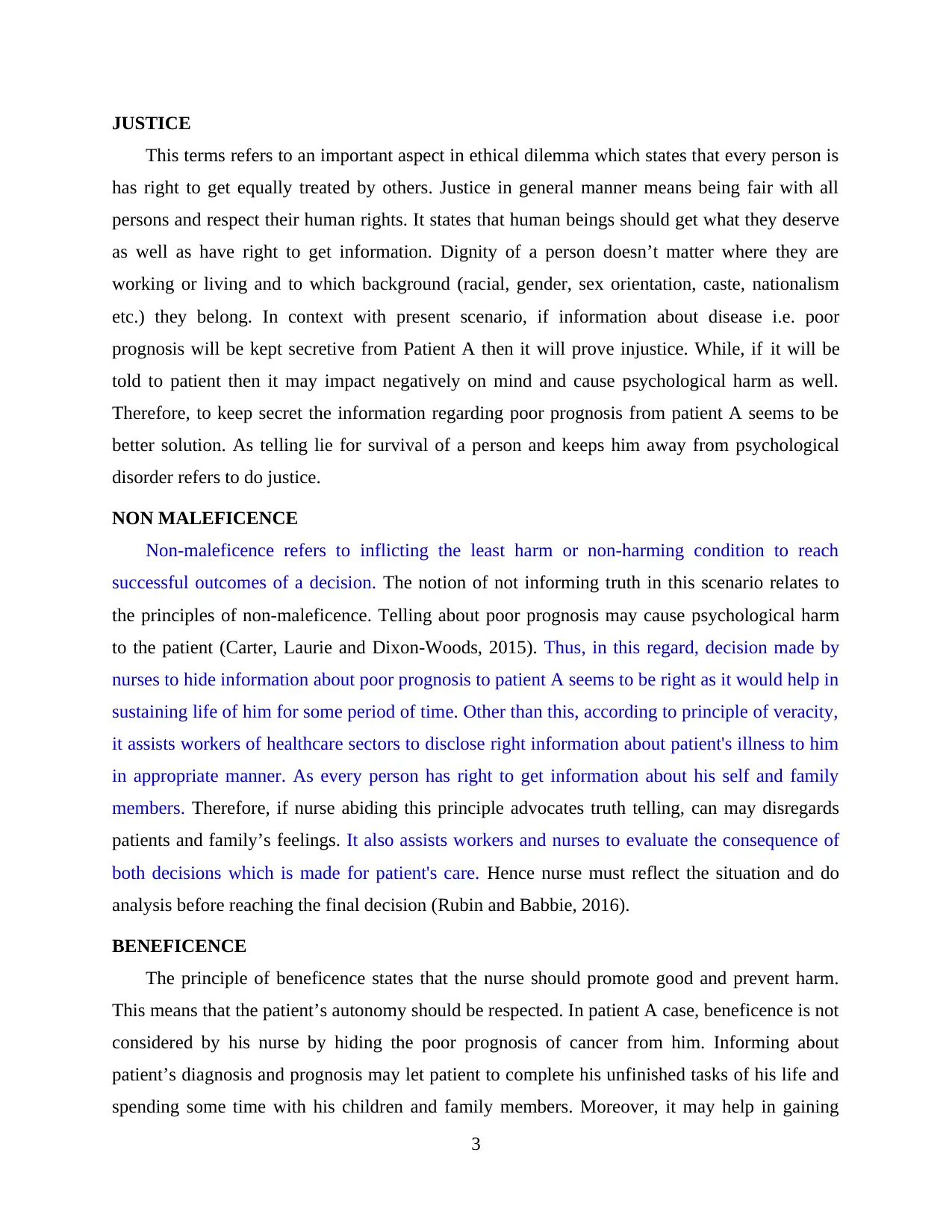
JUSTICE
This terms refers to an important aspect in ethical dilemma which states that every person is
has right to get equally treated by others. Justice in general manner means being fair with all
persons and respect their human rights. It states that human beings should get what they deserve
as well as have right to get information. Dignity of a person doesn’t matter where they are
working or living and to which background (racial, gender, sex orientation, caste, nationalism
etc.) they belong. In context with present scenario, if information about disease i.e. poor
prognosis will be kept secretive from Patient A then it will prove injustice. While, if it will be
told to patient then it may impact negatively on mind and cause psychological harm as well.
Therefore, to keep secret the information regarding poor prognosis from patient A seems to be
better solution. As telling lie for survival of a person and keeps him away from psychological
disorder refers to do justice.
NON MALEFICENCE
Non-maleficence refers to inflicting the least harm or non-harming condition to reach
successful outcomes of a decision. The notion of not informing truth in this scenario relates to
the principles of non-maleficence. Telling about poor prognosis may cause psychological harm
to the patient (Carter, Laurie and Dixon-Woods, 2015). Thus, in this regard, decision made by
nurses to hide information about poor prognosis to patient A seems to be right as it would help in
sustaining life of him for some period of time. Other than this, according to principle of veracity,
it assists workers of healthcare sectors to disclose right information about patient's illness to him
in appropriate manner. As every person has right to get information about his self and family
members. Therefore, if nurse abiding this principle advocates truth telling, can may disregards
patients and family’s feelings. It also assists workers and nurses to evaluate the consequence of
both decisions which is made for patient's care. Hence nurse must reflect the situation and do
analysis before reaching the final decision (Rubin and Babbie, 2016).
BENEFICENCE
The principle of beneficence states that the nurse should promote good and prevent harm.
This means that the patient’s autonomy should be respected. In patient A case, beneficence is not
considered by his nurse by hiding the poor prognosis of cancer from him. Informing about
patient’s diagnosis and prognosis may let patient to complete his unfinished tasks of his life and
spending some time with his children and family members. Moreover, it may help in gaining
3
This terms refers to an important aspect in ethical dilemma which states that every person is
has right to get equally treated by others. Justice in general manner means being fair with all
persons and respect their human rights. It states that human beings should get what they deserve
as well as have right to get information. Dignity of a person doesn’t matter where they are
working or living and to which background (racial, gender, sex orientation, caste, nationalism
etc.) they belong. In context with present scenario, if information about disease i.e. poor
prognosis will be kept secretive from Patient A then it will prove injustice. While, if it will be
told to patient then it may impact negatively on mind and cause psychological harm as well.
Therefore, to keep secret the information regarding poor prognosis from patient A seems to be
better solution. As telling lie for survival of a person and keeps him away from psychological
disorder refers to do justice.
NON MALEFICENCE
Non-maleficence refers to inflicting the least harm or non-harming condition to reach
successful outcomes of a decision. The notion of not informing truth in this scenario relates to
the principles of non-maleficence. Telling about poor prognosis may cause psychological harm
to the patient (Carter, Laurie and Dixon-Woods, 2015). Thus, in this regard, decision made by
nurses to hide information about poor prognosis to patient A seems to be right as it would help in
sustaining life of him for some period of time. Other than this, according to principle of veracity,
it assists workers of healthcare sectors to disclose right information about patient's illness to him
in appropriate manner. As every person has right to get information about his self and family
members. Therefore, if nurse abiding this principle advocates truth telling, can may disregards
patients and family’s feelings. It also assists workers and nurses to evaluate the consequence of
both decisions which is made for patient's care. Hence nurse must reflect the situation and do
analysis before reaching the final decision (Rubin and Babbie, 2016).
BENEFICENCE
The principle of beneficence states that the nurse should promote good and prevent harm.
This means that the patient’s autonomy should be respected. In patient A case, beneficence is not
considered by his nurse by hiding the poor prognosis of cancer from him. Informing about
patient’s diagnosis and prognosis may let patient to complete his unfinished tasks of his life and
spending some time with his children and family members. Moreover, it may help in gaining
3
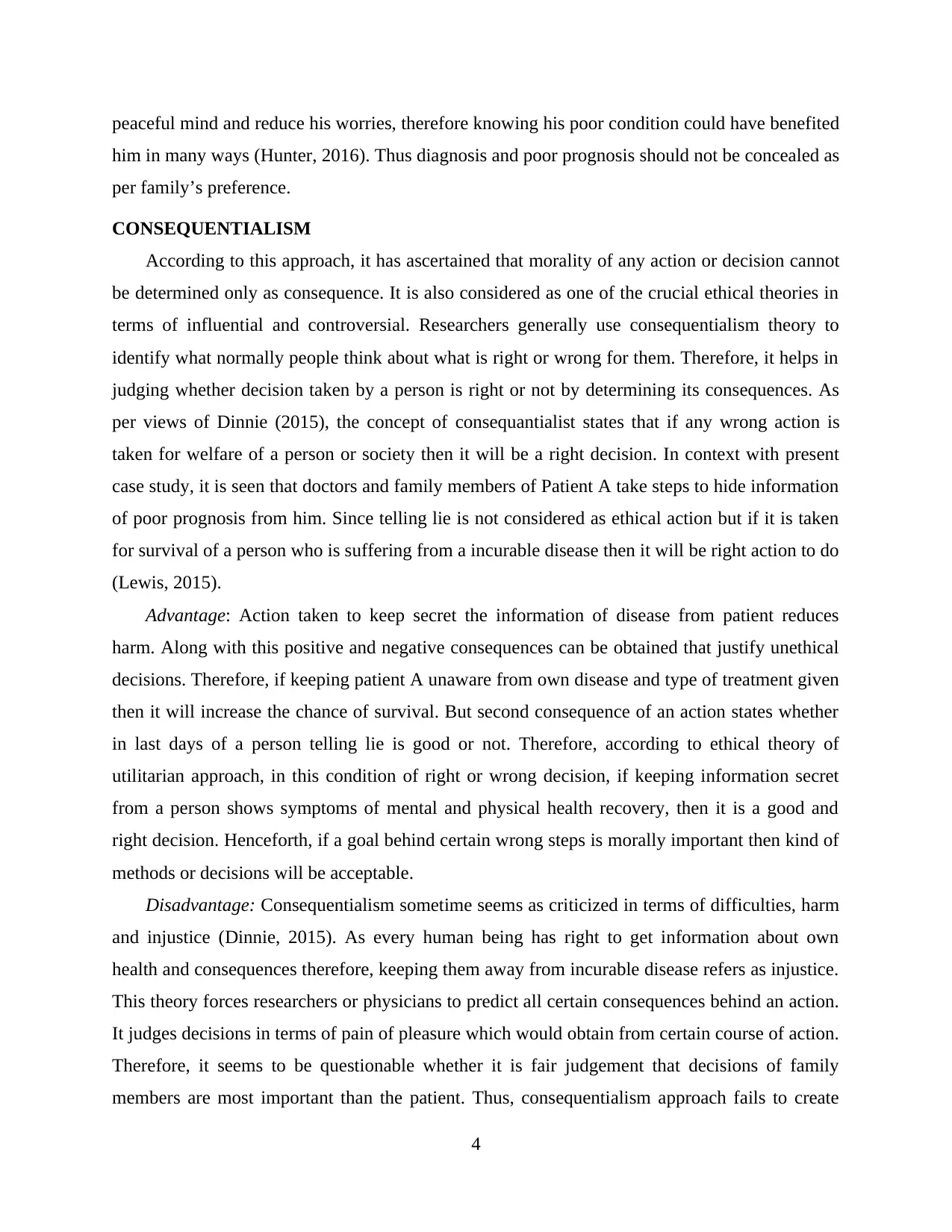
peaceful mind and reduce his worries, therefore knowing his poor condition could have benefited
him in many ways (Hunter, 2016). Thus diagnosis and poor prognosis should not be concealed as
per family’s preference.
CONSEQUENTIALISM
According to this approach, it has ascertained that morality of any action or decision cannot
be determined only as consequence. It is also considered as one of the crucial ethical theories in
terms of influential and controversial. Researchers generally use consequentialism theory to
identify what normally people think about what is right or wrong for them. Therefore, it helps in
judging whether decision taken by a person is right or not by determining its consequences. As
per views of Dinnie (2015), the concept of consequantialist states that if any wrong action is
taken for welfare of a person or society then it will be a right decision. In context with present
case study, it is seen that doctors and family members of Patient A take steps to hide information
of poor prognosis from him. Since telling lie is not considered as ethical action but if it is taken
for survival of a person who is suffering from a incurable disease then it will be right action to do
(Lewis, 2015).
Advantage: Action taken to keep secret the information of disease from patient reduces
harm. Along with this positive and negative consequences can be obtained that justify unethical
decisions. Therefore, if keeping patient A unaware from own disease and type of treatment given
then it will increase the chance of survival. But second consequence of an action states whether
in last days of a person telling lie is good or not. Therefore, according to ethical theory of
utilitarian approach, in this condition of right or wrong decision, if keeping information secret
from a person shows symptoms of mental and physical health recovery, then it is a good and
right decision. Henceforth, if a goal behind certain wrong steps is morally important then kind of
methods or decisions will be acceptable.
Disadvantage: Consequentialism sometime seems as criticized in terms of difficulties, harm
and injustice (Dinnie, 2015). As every human being has right to get information about own
health and consequences therefore, keeping them away from incurable disease refers as injustice.
This theory forces researchers or physicians to predict all certain consequences behind an action.
It judges decisions in terms of pain of pleasure which would obtain from certain course of action.
Therefore, it seems to be questionable whether it is fair judgement that decisions of family
members are most important than the patient. Thus, consequentialism approach fails to create
4
him in many ways (Hunter, 2016). Thus diagnosis and poor prognosis should not be concealed as
per family’s preference.
CONSEQUENTIALISM
According to this approach, it has ascertained that morality of any action or decision cannot
be determined only as consequence. It is also considered as one of the crucial ethical theories in
terms of influential and controversial. Researchers generally use consequentialism theory to
identify what normally people think about what is right or wrong for them. Therefore, it helps in
judging whether decision taken by a person is right or not by determining its consequences. As
per views of Dinnie (2015), the concept of consequantialist states that if any wrong action is
taken for welfare of a person or society then it will be a right decision. In context with present
case study, it is seen that doctors and family members of Patient A take steps to hide information
of poor prognosis from him. Since telling lie is not considered as ethical action but if it is taken
for survival of a person who is suffering from a incurable disease then it will be right action to do
(Lewis, 2015).
Advantage: Action taken to keep secret the information of disease from patient reduces
harm. Along with this positive and negative consequences can be obtained that justify unethical
decisions. Therefore, if keeping patient A unaware from own disease and type of treatment given
then it will increase the chance of survival. But second consequence of an action states whether
in last days of a person telling lie is good or not. Therefore, according to ethical theory of
utilitarian approach, in this condition of right or wrong decision, if keeping information secret
from a person shows symptoms of mental and physical health recovery, then it is a good and
right decision. Henceforth, if a goal behind certain wrong steps is morally important then kind of
methods or decisions will be acceptable.
Disadvantage: Consequentialism sometime seems as criticized in terms of difficulties, harm
and injustice (Dinnie, 2015). As every human being has right to get information about own
health and consequences therefore, keeping them away from incurable disease refers as injustice.
This theory forces researchers or physicians to predict all certain consequences behind an action.
It judges decisions in terms of pain of pleasure which would obtain from certain course of action.
Therefore, it seems to be questionable whether it is fair judgement that decisions of family
members are most important than the patient. Thus, consequentialism approach fails to create
4
⊘ This is a preview!⊘
Do you want full access?
Subscribe today to unlock all pages.

Trusted by 1+ million students worldwide
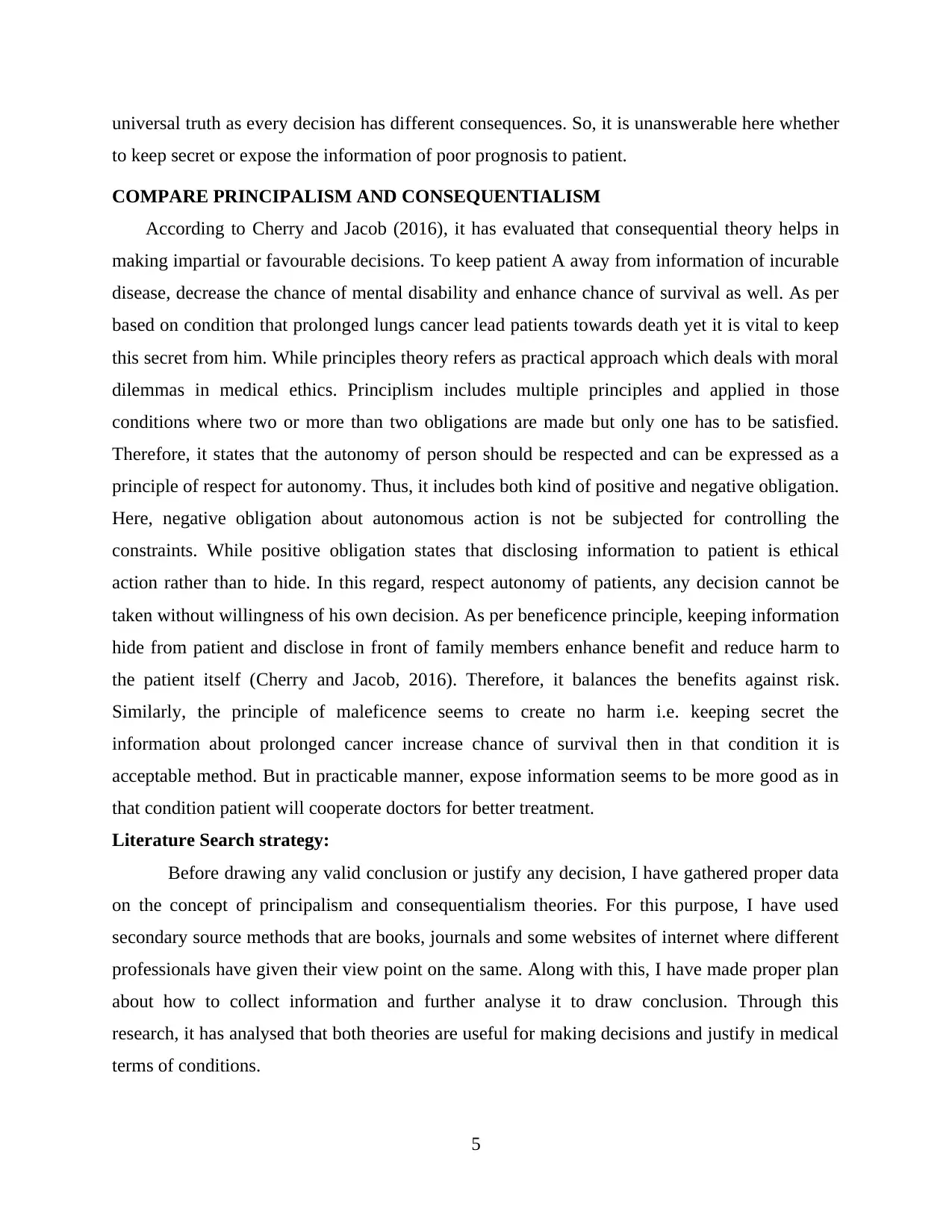
universal truth as every decision has different consequences. So, it is unanswerable here whether
to keep secret or expose the information of poor prognosis to patient.
COMPARE PRINCIPALISM AND CONSEQUENTIALISM
According to Cherry and Jacob (2016), it has evaluated that consequential theory helps in
making impartial or favourable decisions. To keep patient A away from information of incurable
disease, decrease the chance of mental disability and enhance chance of survival as well. As per
based on condition that prolonged lungs cancer lead patients towards death yet it is vital to keep
this secret from him. While principles theory refers as practical approach which deals with moral
dilemmas in medical ethics. Principlism includes multiple principles and applied in those
conditions where two or more than two obligations are made but only one has to be satisfied.
Therefore, it states that the autonomy of person should be respected and can be expressed as a
principle of respect for autonomy. Thus, it includes both kind of positive and negative obligation.
Here, negative obligation about autonomous action is not be subjected for controlling the
constraints. While positive obligation states that disclosing information to patient is ethical
action rather than to hide. In this regard, respect autonomy of patients, any decision cannot be
taken without willingness of his own decision. As per beneficence principle, keeping information
hide from patient and disclose in front of family members enhance benefit and reduce harm to
the patient itself (Cherry and Jacob, 2016). Therefore, it balances the benefits against risk.
Similarly, the principle of maleficence seems to create no harm i.e. keeping secret the
information about prolonged cancer increase chance of survival then in that condition it is
acceptable method. But in practicable manner, expose information seems to be more good as in
that condition patient will cooperate doctors for better treatment.
Literature Search strategy:
Before drawing any valid conclusion or justify any decision, I have gathered proper data
on the concept of principalism and consequentialism theories. For this purpose, I have used
secondary source methods that are books, journals and some websites of internet where different
professionals have given their view point on the same. Along with this, I have made proper plan
about how to collect information and further analyse it to draw conclusion. Through this
research, it has analysed that both theories are useful for making decisions and justify in medical
terms of conditions.
5
to keep secret or expose the information of poor prognosis to patient.
COMPARE PRINCIPALISM AND CONSEQUENTIALISM
According to Cherry and Jacob (2016), it has evaluated that consequential theory helps in
making impartial or favourable decisions. To keep patient A away from information of incurable
disease, decrease the chance of mental disability and enhance chance of survival as well. As per
based on condition that prolonged lungs cancer lead patients towards death yet it is vital to keep
this secret from him. While principles theory refers as practical approach which deals with moral
dilemmas in medical ethics. Principlism includes multiple principles and applied in those
conditions where two or more than two obligations are made but only one has to be satisfied.
Therefore, it states that the autonomy of person should be respected and can be expressed as a
principle of respect for autonomy. Thus, it includes both kind of positive and negative obligation.
Here, negative obligation about autonomous action is not be subjected for controlling the
constraints. While positive obligation states that disclosing information to patient is ethical
action rather than to hide. In this regard, respect autonomy of patients, any decision cannot be
taken without willingness of his own decision. As per beneficence principle, keeping information
hide from patient and disclose in front of family members enhance benefit and reduce harm to
the patient itself (Cherry and Jacob, 2016). Therefore, it balances the benefits against risk.
Similarly, the principle of maleficence seems to create no harm i.e. keeping secret the
information about prolonged cancer increase chance of survival then in that condition it is
acceptable method. But in practicable manner, expose information seems to be more good as in
that condition patient will cooperate doctors for better treatment.
Literature Search strategy:
Before drawing any valid conclusion or justify any decision, I have gathered proper data
on the concept of principalism and consequentialism theories. For this purpose, I have used
secondary source methods that are books, journals and some websites of internet where different
professionals have given their view point on the same. Along with this, I have made proper plan
about how to collect information and further analyse it to draw conclusion. Through this
research, it has analysed that both theories are useful for making decisions and justify in medical
terms of conditions.
5
Paraphrase This Document
Need a fresh take? Get an instant paraphrase of this document with our AI Paraphraser
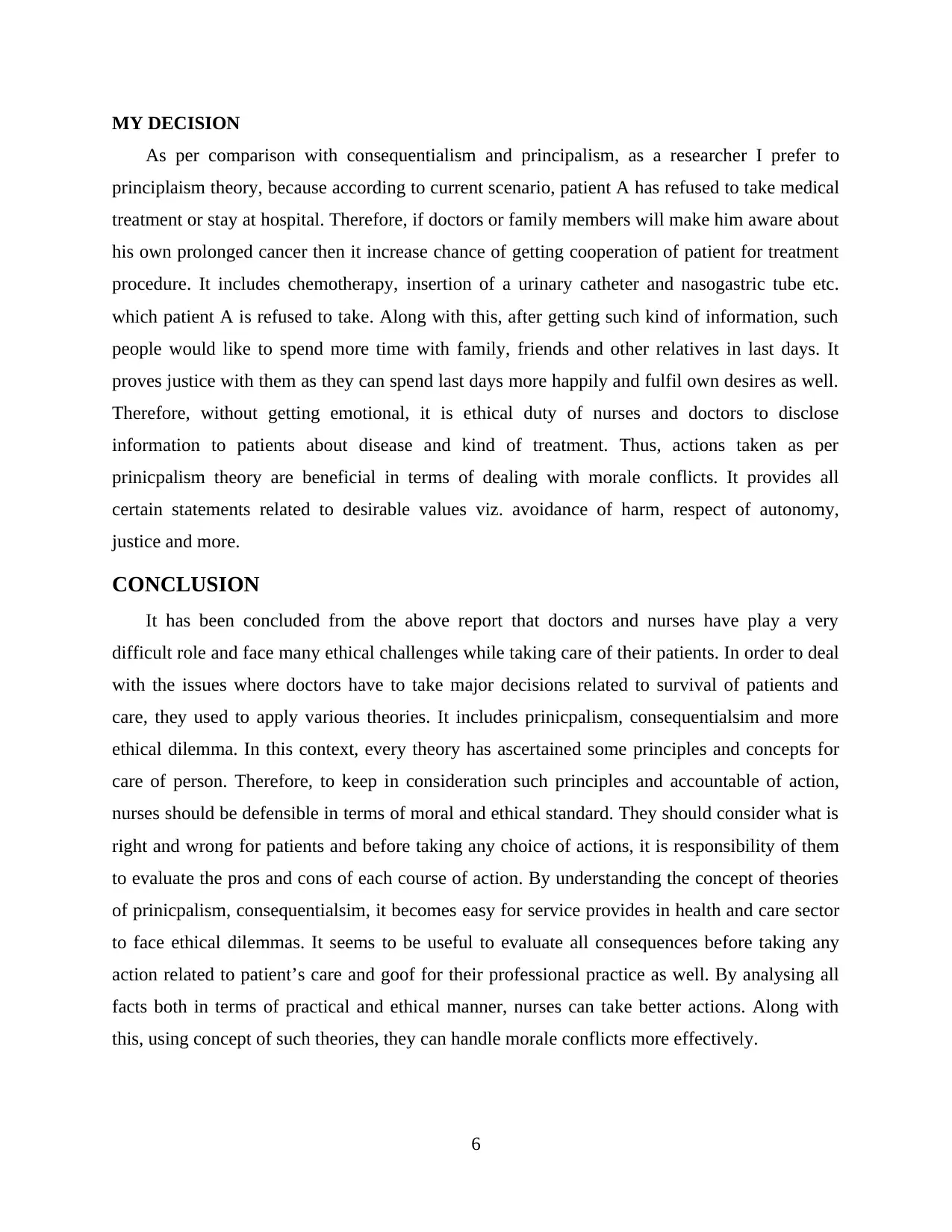
MY DECISION
As per comparison with consequentialism and principalism, as a researcher I prefer to
principlaism theory, because according to current scenario, patient A has refused to take medical
treatment or stay at hospital. Therefore, if doctors or family members will make him aware about
his own prolonged cancer then it increase chance of getting cooperation of patient for treatment
procedure. It includes chemotherapy, insertion of a urinary catheter and nasogastric tube etc.
which patient A is refused to take. Along with this, after getting such kind of information, such
people would like to spend more time with family, friends and other relatives in last days. It
proves justice with them as they can spend last days more happily and fulfil own desires as well.
Therefore, without getting emotional, it is ethical duty of nurses and doctors to disclose
information to patients about disease and kind of treatment. Thus, actions taken as per
prinicpalism theory are beneficial in terms of dealing with morale conflicts. It provides all
certain statements related to desirable values viz. avoidance of harm, respect of autonomy,
justice and more.
CONCLUSION
It has been concluded from the above report that doctors and nurses have play a very
difficult role and face many ethical challenges while taking care of their patients. In order to deal
with the issues where doctors have to take major decisions related to survival of patients and
care, they used to apply various theories. It includes prinicpalism, consequentialsim and more
ethical dilemma. In this context, every theory has ascertained some principles and concepts for
care of person. Therefore, to keep in consideration such principles and accountable of action,
nurses should be defensible in terms of moral and ethical standard. They should consider what is
right and wrong for patients and before taking any choice of actions, it is responsibility of them
to evaluate the pros and cons of each course of action. By understanding the concept of theories
of prinicpalism, consequentialsim, it becomes easy for service provides in health and care sector
to face ethical dilemmas. It seems to be useful to evaluate all consequences before taking any
action related to patient’s care and goof for their professional practice as well. By analysing all
facts both in terms of practical and ethical manner, nurses can take better actions. Along with
this, using concept of such theories, they can handle morale conflicts more effectively.
6
As per comparison with consequentialism and principalism, as a researcher I prefer to
principlaism theory, because according to current scenario, patient A has refused to take medical
treatment or stay at hospital. Therefore, if doctors or family members will make him aware about
his own prolonged cancer then it increase chance of getting cooperation of patient for treatment
procedure. It includes chemotherapy, insertion of a urinary catheter and nasogastric tube etc.
which patient A is refused to take. Along with this, after getting such kind of information, such
people would like to spend more time with family, friends and other relatives in last days. It
proves justice with them as they can spend last days more happily and fulfil own desires as well.
Therefore, without getting emotional, it is ethical duty of nurses and doctors to disclose
information to patients about disease and kind of treatment. Thus, actions taken as per
prinicpalism theory are beneficial in terms of dealing with morale conflicts. It provides all
certain statements related to desirable values viz. avoidance of harm, respect of autonomy,
justice and more.
CONCLUSION
It has been concluded from the above report that doctors and nurses have play a very
difficult role and face many ethical challenges while taking care of their patients. In order to deal
with the issues where doctors have to take major decisions related to survival of patients and
care, they used to apply various theories. It includes prinicpalism, consequentialsim and more
ethical dilemma. In this context, every theory has ascertained some principles and concepts for
care of person. Therefore, to keep in consideration such principles and accountable of action,
nurses should be defensible in terms of moral and ethical standard. They should consider what is
right and wrong for patients and before taking any choice of actions, it is responsibility of them
to evaluate the pros and cons of each course of action. By understanding the concept of theories
of prinicpalism, consequentialsim, it becomes easy for service provides in health and care sector
to face ethical dilemmas. It seems to be useful to evaluate all consequences before taking any
action related to patient’s care and goof for their professional practice as well. By analysing all
facts both in terms of practical and ethical manner, nurses can take better actions. Along with
this, using concept of such theories, they can handle morale conflicts more effectively.
6
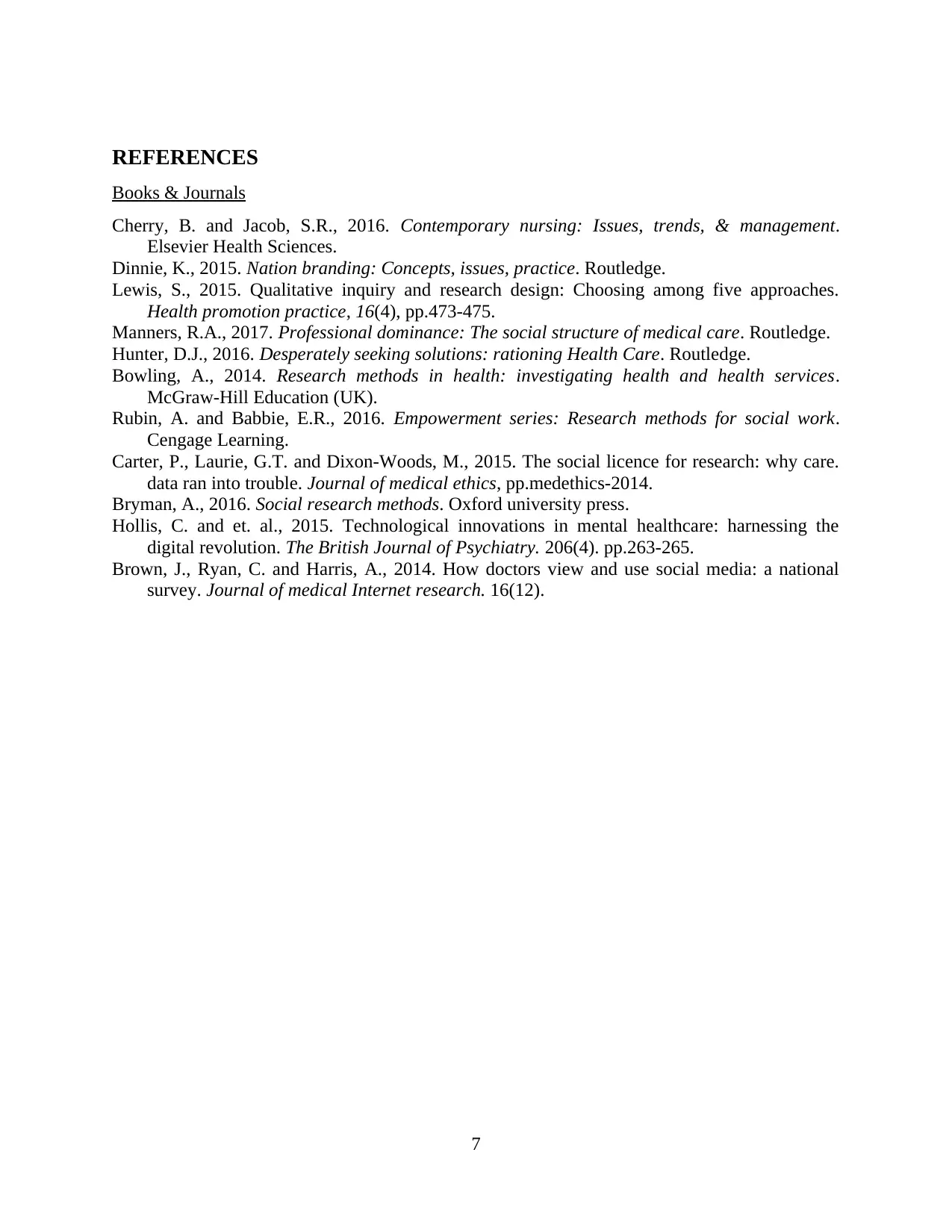
REFERENCES
Books & Journals
Cherry, B. and Jacob, S.R., 2016. Contemporary nursing: Issues, trends, & management.
Elsevier Health Sciences.
Dinnie, K., 2015. Nation branding: Concepts, issues, practice. Routledge.
Lewis, S., 2015. Qualitative inquiry and research design: Choosing among five approaches.
Health promotion practice, 16(4), pp.473-475.
Manners, R.A., 2017. Professional dominance: The social structure of medical care. Routledge.
Hunter, D.J., 2016. Desperately seeking solutions: rationing Health Care. Routledge.
Bowling, A., 2014. Research methods in health: investigating health and health services.
McGraw-Hill Education (UK).
Rubin, A. and Babbie, E.R., 2016. Empowerment series: Research methods for social work.
Cengage Learning.
Carter, P., Laurie, G.T. and Dixon-Woods, M., 2015. The social licence for research: why care.
data ran into trouble. Journal of medical ethics, pp.medethics-2014.
Bryman, A., 2016. Social research methods. Oxford university press.
Hollis, C. and et. al., 2015. Technological innovations in mental healthcare: harnessing the
digital revolution. The British Journal of Psychiatry. 206(4). pp.263-265.
Brown, J., Ryan, C. and Harris, A., 2014. How doctors view and use social media: a national
survey. Journal of medical Internet research. 16(12).
7
Books & Journals
Cherry, B. and Jacob, S.R., 2016. Contemporary nursing: Issues, trends, & management.
Elsevier Health Sciences.
Dinnie, K., 2015. Nation branding: Concepts, issues, practice. Routledge.
Lewis, S., 2015. Qualitative inquiry and research design: Choosing among five approaches.
Health promotion practice, 16(4), pp.473-475.
Manners, R.A., 2017. Professional dominance: The social structure of medical care. Routledge.
Hunter, D.J., 2016. Desperately seeking solutions: rationing Health Care. Routledge.
Bowling, A., 2014. Research methods in health: investigating health and health services.
McGraw-Hill Education (UK).
Rubin, A. and Babbie, E.R., 2016. Empowerment series: Research methods for social work.
Cengage Learning.
Carter, P., Laurie, G.T. and Dixon-Woods, M., 2015. The social licence for research: why care.
data ran into trouble. Journal of medical ethics, pp.medethics-2014.
Bryman, A., 2016. Social research methods. Oxford university press.
Hollis, C. and et. al., 2015. Technological innovations in mental healthcare: harnessing the
digital revolution. The British Journal of Psychiatry. 206(4). pp.263-265.
Brown, J., Ryan, C. and Harris, A., 2014. How doctors view and use social media: a national
survey. Journal of medical Internet research. 16(12).
7
⊘ This is a preview!⊘
Do you want full access?
Subscribe today to unlock all pages.

Trusted by 1+ million students worldwide
1 out of 9
Related Documents
Your All-in-One AI-Powered Toolkit for Academic Success.
+13062052269
info@desklib.com
Available 24*7 on WhatsApp / Email
![[object Object]](/_next/static/media/star-bottom.7253800d.svg)
Unlock your academic potential
Copyright © 2020–2025 A2Z Services. All Rights Reserved. Developed and managed by ZUCOL.





